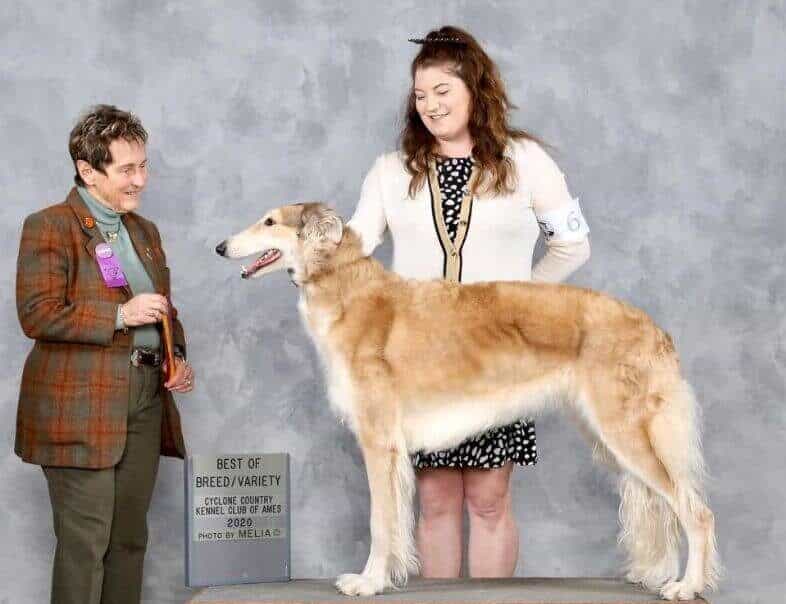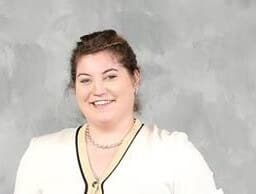
Home » Interview with Owner Handler Kelley Frary

Interview with Owner Handler, Kelley Frary – Purebred Doberman Pinscher and Borzoi Dog Breeds
I’m Kelley Frary and I live in Des Moines, Iowa. I’m a realtor in my everyday life, but a huge advocate for dogs in my free time. I’m a member of several canine organizations here in Iowa and compete in several other sports in addition to conformation.
I got my first well-bred dog at 23 and planned on just dabbling in shows and trying it out. Lo and behold, I’ve spent the last seven years fully enjoying every opportunity! The friends and family I’ve made through dogs have truly been the gift of a lifetime.
Kelley Frary: I, from a very young age, watched the greats at Westminster and the National Dog Show. I was enchanted by the opportunity to shine with your canine companion and have your moment to represent a breed that you are deeply passionate about. I asked my mother if we would be able to look into getting a Doberman Pinscher, as they were a favorite of mine, and she replied, “They’re too scary. You’ll have to get one when you’re an adult.” So, as soon as I found myself able as an adult… I did years of research to land on the perfect breeder, which is what started my Owner Handler journey.
I, from a very young age, watched the greats at Westminster and the National Dog Show… I did years of research to land on the perfect breeder, which is what started my Owner Handler journey.
Kelley Frary: I’ve been in the sport of purebred dogs for seven years. All seven of those years were spent owner handling. I’ve got both a GCH Doberman (AKC GCH U-GCH Old Drum’s Red Rockefeller CGCA CAA DDCN NW2 TKN SCN SEN SIN SPOT) and a GCH Borzoi (GCH Konza Sojourn In A Gadda Da Vida SC CA). I just recently bred a singleton Borzoi puppy.
Kelley Frary: I’m so blessed to have a wealth of opportunities with handling classes here in the central Iowa area. We truly have a familial vibe in those classes to judge/help each other and improve our handling skills. I’ve been fortunate to attend a couple of handling seminars offered at shows done by professional handlers, which I’ve found to be extremely helpful for honing my handling skills.
Kelley Frary: I’ve found social media to be a great place for feedback on improving things or for encouragement to keep going when I find difficulties. I think the best tool I’ve found online is watching my breeds at big events like the National Dog Show or Westminster or live streams of specialties, and emulating what I see to improve.
Kelley Frary: At the end of the day, I think we can all agree that our dogs are fantastic regardless of their ranking. However, being a competitive person, I do enjoy the chase of staying in the Top 20 rankings for my breeds and I enjoy being in Groups with other Owner Handlers. It is a huge honor when I get to present my dogs at the national in the Owner Handler Top 20, and get to go around the ring and celebrate our year of success!
Kelley Frary: I’m most likely to enter the Puppy Classes or American-Bred Class. I find those classes to be a little forgiving of mistakes, whether that’s by my handling or a novice dog.
Kelley Frary: When I entered the Doberman Pinscher breed, I was told that it would be incredibly difficult to finish my dog’s championship owner-handled. One thing I’ve found is that my breed is blessed with some of the best handlers in the world, and watching their techniques and professionalism was such a great learning tool for myself.
Kelley Frary: I definitely was when I first started. It certainly took me a couple of years to find confidence in my handling abilities and in my dog. I think I was more intimidated by Professional Handlers than by Judges. But after getting to know some, this definitely softened and I was able to feel more relaxed. Consequently, being more relaxed helped me and my dog to perform better—and I started seeing some great results!
Kelley Frary: I’ve really bonded with Owner Handlers in other breeds and I think it’s important to have that connection on especially hard days at the dog show. It’s truly a familial vibe of encouragement when I’m in the ring and I look forward to seeing my friends’ faces when I’m nervous.
I’ve really bonded with Owner Handlers in other breeds and I think it’s important to have that connection on especially hard days at the dog show
Kelley Frary: I think it’s incredibly important to embrace the Owner Handlers, as they often can be more connected with the general public. Their success in the dog world certainly shows and I believe it’s a great tool to get other people interested. They are great advocates for the sport!
Kelley Frary: Owner handling my Doberman to his Grand Championship was a huge goal of mine. He has won several Owner-Handled RBIS placements, but has never won the Owner-Handled BIS honor. He’s going to be turning seven this year, so I’m tempted to bring him out for the Veteran Class and chase down that last goal!
Kelley Frary: I remember one of my very first shows where I was handed a Best Owner-Handled ribbon, but truly had no idea what that meant or what I needed to do after receiving it. I stayed to watch Groups in the afternoon, fully not understanding that I was going to need to enter the NOHS Working Group ring.
After watching them enter, somebody asked me why I wasn’t in the ring and it occurred to me that that’s what the ribbon meant. I was so embarrassed to enter late into the ring and stop the judge from what he was doing, but I mustered up the courage. The judge was incredibly nice and let me go around. It’s funny to think how far we’ve come from that moment!
